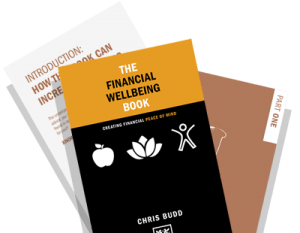Money can’t buy happiness, as the saying goes. It’s true that you can’t just walk into the local “wellbeing” shop and purchase your desired level of happiness. But surely there must be a link between money and how we feel? Financial wellbeing is about the study and application of how money can make us happier, not just wealthier.
There are five elements to wellbeing in general, which I wrote about in an earlier article here. Studies show that social wellbeing can have the biggest impact on your happiness overall. But it’s financial wellbeing that takes a central role in support of career, community, physical and social wellbeing.
So if money can’t buy happiness directly, how can we make it work for us? Let’s look at how the five elements of financial wellbeing can help.
A clear path to identifiable objectives
First of all, you need to be satisfied with your standard of living, both for now and your desired future. This means being clear on how much money you need, but also learning to be satisfied with what you have.
It doesn’t mean that you can’t have bold ambitions for the future. It’s likely that you’ll have some dreams and aspirations, but do you have a clear and workable plan to achieve these? Financial planning can help set goals and identify a path to get there, but you must invest time to do it properly.
It’s almost impossible to challenge yourself without help from others. Through no fault of your own, you may have various self-limiting beliefs and negative assumptions about what’s possible. A good financial planner or coach can help here, with the result being a positive and exciting vision for the future. Build in a step-by-step plan of action, and you have a clear path to identifiable objectives.
Control of daily finances
Having a clear vision and a plan to get there is a great first step, but you won’t make progress without control of day-to-day spending. This is an area where many people struggle. With an endless bombardment of advertising, one-click purchases and easy access to credit, it can be difficult to maintain control.
You also need to consider whether or not the money you spend is bringing joy. Retail therapy may bring a short term hit of the “happiness hormone”, dopamine, but the effect quickly wears off and guilt often sets in.
With coaching, you can identify and change financial behaviours that will empower you with more control. That can bring increased happiness as your brain “re-trains” to release dopamine when you save or invest money, rather than spend it.
The ability to cope with a financial shock
It’s great to focus on how wellbeing can be positively improved. But we also need to think about how a reduction in financial wellbeing might be avoided.
In life, things go wrong that are beyond our control. Household appliance breakdowns, car repairs, illness, redundancy, stock market crashes, even death.
We might not be able to prevent these things from happening, but we can, at least, plan to minimise the financial impact. Practical solutions like emergency funds, insurance policies and well-balanced investment portfolios can all help.
When it comes to temporary investment losses, this can often be highly emotional. The behavioural bias, loss aversion, causes us to feel the pain of a loss much more acutely than the joy of a gain. Working with a financial planner or coach can help prepare for these emotional shocks.
Financial options in life
With the first 3 areas of financial wellbeing addressed, you will be in control of your money, have a clear financial plan and the confidence to deal with unexpected shocks.
That puts you in the position to start thinking about the luxury of choice. This can be trickier than it sounds. With temptation all around and a tendency to compare ourselves with others, poor short-term financial choices are commonplace.

On the other hand, maybe you’ve never really given yourself permission to dream. Not properly. Even if you do have a vision for the future, self-limiting beliefs can prevent it from becoming reality. A goal without a plan remains just a dream. Options needs to be created and choices made.
It comes back to identifying what it is that makes you feel most satisfied. You can then find a way to adjust your standard of living to gain that level of satisfaction. Or you can adjust your expectations to be more in line with your current standard of living.
This balancing act is different for everyone, and it can sometimes involve a trade-off between the present and the future.
Clarity and security for those we leave behind
This is the part you might rather avoid thinking about. No one likes to think too much about their own death. But actually, getting your affairs in order can bring about huge peace of mind.
The thought of leaving behind a financial mess can be stressful. Especially if you keep procrastinating, then find yourself with a life-threatening illness. Yet, most people do not have a valid, up to date will.
It can also be about ensuring the financial security of anyone dependent on you. Or perhaps more positively, leaving a legacy for causes that you care about.
It’s not just about the money. Lack of clarity on who should look after children, funeral wishes and distribution of cherished possessions can all gnaw away at your wellbeing.
You can even bring clarity about who makes decisions about your own care and money if you become too unwell in the future. Powers of Attorney should be considered before they are needed, not when they are needed.
The Financial Wellbeing Book
The five elements of financial wellbeing above are taken from this superb book by author, Chris Budd, who is also founder of the Institute for Financial Wellbeing.
You can find out more about the book and buy a copy here.
Summary
Money can help to improve happiness when used to support the other areas of wellbeing: Career, Social, Community and Physical.
Working with a financial coach can help you reflect on your overall balance of wellbeing, then prioritising how best to approach your finances. For example, I help individuals and couples to make practical progress through all five elements of financial wellbeing via my ‘SPEND’ system, whihc you can read more about in ‘The 5 Blocks of Financial Success’.
If you fancy a chat about any of this, get in touch, or if you don’t feel ready for that just yet, subscribe to my weekly newsletter for more thoughts about money and lifestyle.






 Production
Production